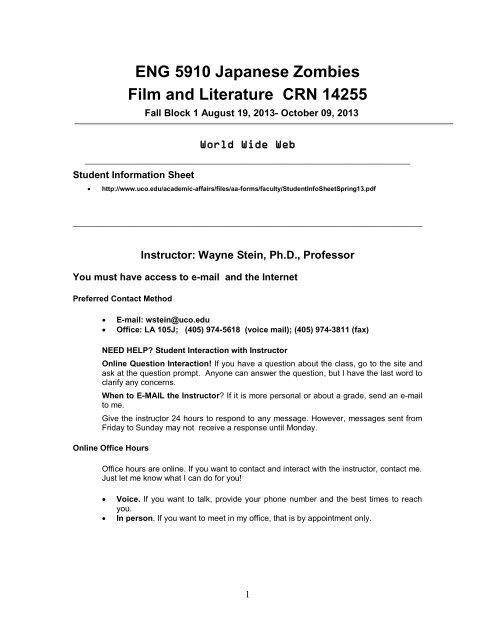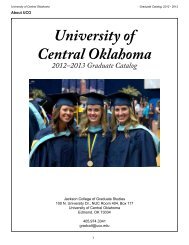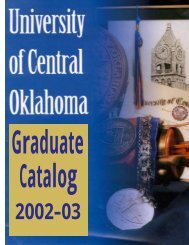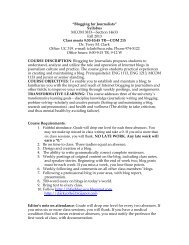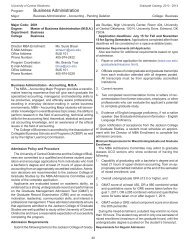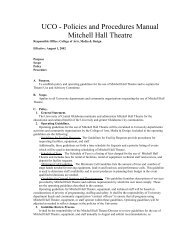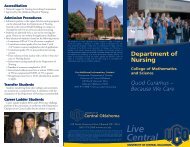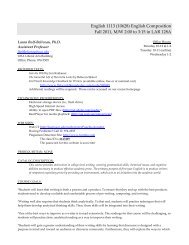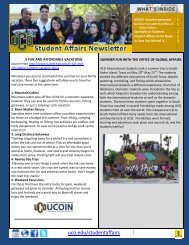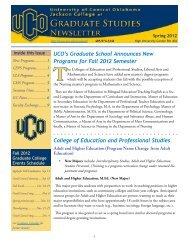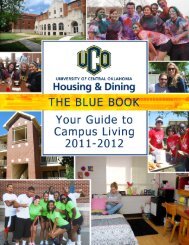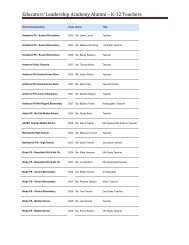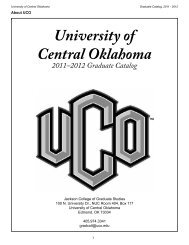Japanese Zombies Film and Literature: Dr. Wayne Stein
Japanese Zombies Film and Literature: Dr. Wayne Stein
Japanese Zombies Film and Literature: Dr. Wayne Stein
Create successful ePaper yourself
Turn your PDF publications into a flip-book with our unique Google optimized e-Paper software.
ENG 5910 <strong>Japanese</strong> <strong>Zombies</strong><br />
<strong>Film</strong> <strong>and</strong> <strong>Literature</strong> CRN 14255<br />
Fall Block 1 August 19, 2013- October 09, 2013<br />
World Wide Web<br />
___________________________________________________________________<br />
Student Information Sheet<br />
http://www.uco.edu/academic-affairs/files/aa-forms/faculty/StudentInfoSheetSpring13.pdf<br />
________________________________________________________________________<br />
Instructor: <strong>Wayne</strong> <strong>Stein</strong>, Ph.D., Professor<br />
You must have access to e-mail <strong>and</strong> the Internet<br />
Preferred Contact Method<br />
<br />
<br />
E-mail: wstein@uco.edu<br />
Office: LA 105J; (405) 974-5618 (voice mail); (405) 974-3811 (fax)<br />
NEED HELP? Student Interaction with Instructor<br />
Online Question Interaction! If you have a question about the class, go to the site <strong>and</strong><br />
ask at the question prompt. Anyone can answer the question, but I have the last word to<br />
clarify any concerns.<br />
When to E-MAIL the Instructor? If it is more personal or about a grade, send an e-mail<br />
to me.<br />
Give the instructor 24 hours to respond to any message. However, messages sent from<br />
Friday to Sunday may not receive a response until Monday.<br />
Online Office Hours<br />
Office hours are online. If you want to contact <strong>and</strong> interact with the instructor, contact me.<br />
Just let me know what I can do for you!<br />
<br />
<br />
Voice. If you want to talk, provide your phone number <strong>and</strong> the best times to reach<br />
you.<br />
In person. If you want to meet in my office, that is by appointment only.<br />
1
<strong>Japanese</strong> <strong>Zombies</strong> <strong>Film</strong> <strong>and</strong> <strong>Literature</strong>: <strong>Dr</strong>. <strong>Wayne</strong> <strong>Stein</strong><br />
Biography<br />
Being a professor <strong>and</strong> the Assistant Chair of the English Department, he teaches classes on<br />
Asian culture, world literature, <strong>and</strong> the history of rhetoric. He was awarded the DaVinci Fellow<br />
from the Oklahoma's Creativity Think Tank (2008), the ESL Professional of the Year Award from<br />
OKTESOL (2003), the Service to the Sanga (Community) Award from the Stillwater OSU<br />
Buddhist Society (2003), <strong>and</strong> various other awards. He has published books, chapters, <strong>and</strong><br />
articles for newsletters, newspapers, <strong>and</strong> encyclopedias. He graduated from Oklahoma State<br />
University with a Ph.D. in English.<br />
Course Description<br />
This class examines the <strong>Japanese</strong> zombies as a new cultural form of yokai (monsters).<br />
The economic (capitalism, zaibatsu, zombie corporations) <strong>and</strong> religious (Shintoism,<br />
Buddhism, <strong>and</strong> Confucius) backgrounds of this horror genre will be studied. A<br />
comparison of the <strong>Japanese</strong> zombie films to Western zombie films will be examined.<br />
5910 Prerequisite: Graduate St<strong>and</strong>ing.<br />
Purpose of the course<br />
By examining the political, social <strong>and</strong> cultural background of the <strong>Japanese</strong> Recession of<br />
the 1990’s, a greater underst<strong>and</strong>ing of the rise of a new genre for films about the living<br />
dead will occur. The <strong>Japanese</strong> Zombie films became popular during the millennium <strong>and</strong><br />
the first decade of the twentieth century. What are these films criticizing about <strong>Japanese</strong><br />
culture? What can we learn from these films as we try to survive our own recession?<br />
Required Texts<br />
If you order online, be sure to add additional postage to insure you receive the works in a timely<br />
fashion. Deadlines will not be extended because you had to wait for the works.<br />
1) Mikamoto, Rei. Reiko the Zombie Shop. Vol. 1 Milwaukie: Dark Horse, 2007.<br />
2) Sato, Saikuke. Highschool of the Dead. Vol.1. Yen Press, 2011.<br />
3) PeachPit. Zombie Loan. Vol 1. New York: Yen Press, 2008.<br />
4) Hanakuma, Yusaku.Tokyo Zombie. New York: Last Gasp, 2008.<br />
Required DVDs<br />
Warning: The UC bookstore only orders a few of each film. There should be no excuse for not<br />
having the film reactions on time. Yes, you can get them from a video store or even find them<br />
in the library, but there can be competition because everyone is trying to get the films at the<br />
same time. When possible, work a week or so ahead of time. Don't wait until the last minute to<br />
find the film, find time to watch the film, <strong>and</strong> then write the report. Some of the films are quite<br />
long. Others will be available via online rentals like Netflix.<br />
<br />
Battle Girl: Living Dead in Tokyo Bay (1992), directed by Kazuo Komizu
<strong>Japanese</strong> <strong>Zombies</strong> <strong>Film</strong> <strong>and</strong> <strong>Literature</strong>: <strong>Dr</strong>. <strong>Wayne</strong> <strong>Stein</strong><br />
Versus (2000), directed by Ryuhei Kitamura<br />
Wild Zero (2000), directed by Tetsuro Takeuchi<br />
Stacy: Attack of the Schoolgirl <strong>Zombies</strong> (2001), directed by Naoyuki Tomomatsu<br />
Tokyo Zombie (2005), directed by Sakichi Sato<br />
Zombie Self Defense Force (2006)<br />
Zombie Loan (2007), directed by Akira Nishimiri<br />
Chanbara Beauty (2008), directed by Yohei Fukuda<br />
Highschool of the Dead (2011), directed by Tetsuro Araki<br />
Hell <strong>Dr</strong>iver (2011), directed by Yoshihiro Nishimura<br />
Policies<br />
Transformational Learning Objectives (Central Six)<br />
Transformative learning goals (the Central Six) have been identified as: Discipline Knowledge;<br />
Leadership; Problem Solving (Research, Scholarly <strong>and</strong> Creative Activities); Service Learning <strong>and</strong><br />
Civic Engagement; Global <strong>and</strong> Cultural Competencies; <strong>and</strong> Health <strong>and</strong> Wellness.<br />
This course addresses discipline knowledge; leadership; problems solving (research,<br />
scholarly <strong>and</strong> creative activities); service learning <strong>and</strong> civic engagement; global <strong>and</strong><br />
cultural competencies, health <strong>and</strong> wellness of the university's transformative learning goals.<br />
Specifically, these goals are met by the following methods:<br />
<br />
<br />
<br />
<br />
<br />
<br />
By engaging in the course material <strong>and</strong> lectures, students will gain a competency in<br />
discipline knowledge. They will gain a knowledge of the various scholars <strong>and</strong> issues, the<br />
major authors/filmmakers, <strong>and</strong> the key works associated within the field of study.<br />
Students shall show leadership skills by engaging in each week's discussions; by<br />
examining topics related to the social, cultural, <strong>and</strong> philosophical contexts of the texts<br />
under discussion; <strong>and</strong> by defining <strong>and</strong> developing major independent research projects.<br />
They must demonstrate a sensitivity to listening to others while respecting their views.<br />
Students don’t have to agree. Having proper etiquette skills is key to developing a<br />
leadership persona.<br />
Students will underst<strong>and</strong> about service learning <strong>and</strong> civic engagement in this course.<br />
Living within the hierarchy of service <strong>and</strong> respect for others demonstrates civic<br />
competency. To be part of the culture <strong>and</strong> audience is to be engaged with the community.<br />
Civic engagement is a key characteristic of being an informed citizen of the world.<br />
During the course, students will use problem solving skills like searching for academic<br />
sources <strong>and</strong> valuable background information. Thus, students will participate in research<br />
<strong>and</strong> scholarly activities as they explore a wide range of texts, visual <strong>and</strong> written, while<br />
completing important research projects. Critical thinking is a crucial part of problem<br />
solving.<br />
Students will obtain global <strong>and</strong> cultural competencies through the intensive study of<br />
social, political, religious <strong>and</strong> philosophical movements.<br />
Finally, students will approach the mental health <strong>and</strong> wellness of other cultures <strong>and</strong><br />
compare that to the psychological, psychic <strong>and</strong> social norms of Western culture.
<strong>Japanese</strong> <strong>Zombies</strong> <strong>Film</strong> <strong>and</strong> <strong>Literature</strong>: <strong>Dr</strong>. <strong>Wayne</strong> <strong>Stein</strong><br />
Course Expectations:<br />
Students will contribute to class discussions on films, readings, <strong>and</strong> issues.<br />
Students will participate in simulations: role playing games (RPG) <strong>and</strong> write out their<br />
results.<br />
Students will have to use critical reading skills in a multimodal approach of textual <strong>and</strong><br />
visual discourses.<br />
Students will complete a written report involving drafting, revision, <strong>and</strong> editing skills.<br />
Students will investigate <strong>and</strong> research, along with how to correctly site sources.<br />
Students will use problems solving skills when researching <strong>and</strong> being involved in<br />
simulations.<br />
Students will be engaged in critical analysis where critical thinking skills are a must.<br />
Participation in Communicative Learning<br />
Students will engage in class discussions where they will have an opportunity to interact, to<br />
question, <strong>and</strong> to react to responses posted by other students. Interaction in course discussions<br />
can add value to the class participation. Student will have the opportunity for:<br />
<br />
<br />
Engagement <strong>and</strong> Interactivity.<br />
Student - Peer Interaction.<br />
Therefore, if you find a student’s post to be of high quality or invigorating to read, let the student<br />
know. Online learning can be as stimulating as a regular class only if you add addition peer<br />
feedback to others.<br />
Multimodal Approach: Text, Graphics, Sound, <strong>and</strong> Video<br />
This course presents the information in a variety of delivery styles: text, graphics, sound, <strong>and</strong><br />
video links. Critical writing skills are developed from critical reading skills. The text provides a<br />
starting point for being critical. Graphics reinforce what the text delivers. Sound or music can also<br />
stimulate different parts of the brain. Video links will also help in this multimodal approaching to<br />
learning.<br />
Graduate Writing Expectations<br />
All graduate students are expected to write, think, <strong>and</strong> participate at a higher<br />
level of consciousness. Therefore, a higher level of quality is required. Study<br />
smart <strong>and</strong> work hard while being critical. Impress me.<br />
ADA Statement regarding special accommodations<br />
The University of Central Oklahoma complies with Section 504 of the Rehabilitation Act of<br />
1973 <strong>and</strong> the Americans with Disabilities Act of 1990. Students with disabilities who need<br />
special accommodations must contact the assistant director of Disability Support Services,<br />
Kim Fields, in room 309 of the Nigh University Center, (405) 974-2549.
<strong>Japanese</strong> <strong>Zombies</strong> <strong>Film</strong> <strong>and</strong> <strong>Literature</strong>: <strong>Dr</strong>. <strong>Wayne</strong> <strong>Stein</strong><br />
It is the student's responsibility to contact the instructor as soon as possible after the DSS has<br />
verified the need for accommodations to ensure that such accommodations are implemented<br />
in a timely fashion.<br />
VISIT DAILY<br />
Make it a habit to visit the site daily <strong>and</strong> read what others write. You can post assignments<br />
ahead of time. You can react to other posts. You can answer a question that another student<br />
asks if you think you know the answer. By visiting daily, you stay active <strong>and</strong> engaged. Keep<br />
to the subject of the class.<br />
It is so easy to forget a due date or that the class exists. Be vigorous <strong>and</strong> show enthusiasm.<br />
Do extra work. Don't be average. I know how many times you visit, how many times you<br />
post, <strong>and</strong> how much time you put into the class.<br />
Regents' Statement on Homework Expectations<br />
It is expected that a full-time college student will spend a minimum amount of time each week<br />
in class attendance <strong>and</strong> study out of a class approaching a 40-hour work week. A person<br />
employed on a full time basis should not simultaneously expect to maintain a full-time<br />
academic schedule.<br />
At the undergraduate level, this means that for each hour in class, a student is expected to<br />
spend at least three (3) hours doing homework. For a three credit class, a student is expected<br />
to spend nine (9) hours a week doing homework.<br />
Attendance Policy <strong>and</strong> Due Dates<br />
Since this is a cyber class, we meet only through cyberspace. There is no attendance policy<br />
because there is no physical class to attend; however, students have specific due dates, <strong>and</strong><br />
midnight, central st<strong>and</strong>ard time, is the exact time for each due date.<br />
Policy for Late Assignments<br />
A student will not be reminded that a due date is coming up, nor will a student be contacted if an<br />
assignment has not been posted. Double check.<br />
Contact the instructor, wstein@uco.edu, before an assignment is due if any problems arise to<br />
cause one to miss the due date. Failure to contact the instructor will mean that it may not be<br />
accepted.<br />
Reports posted late, after midnight, cannot be posted unless the instructor is contacted. Give him<br />
a day to allow permission. Be sure to e-mail for permission <strong>and</strong> send a copy of the report to<br />
wstein@uco.edu. You will still be asked to post it.<br />
Anything posted after the due time will have points deducted: 35 points a day.<br />
ONLINE TIME FACTOR:<br />
Since this is a cyber class, we meet only through cyberspace. Students have specific due<br />
dates, <strong>and</strong> midnight, central st<strong>and</strong>ard time, is the exact time for each due date.
<strong>Japanese</strong> <strong>Zombies</strong> <strong>Film</strong> <strong>and</strong> <strong>Literature</strong>: <strong>Dr</strong>. <strong>Wayne</strong> <strong>Stein</strong><br />
Students will not be reminded that a due date is coming up, nor will a student be contacted if<br />
an assignment has not been posted. Contact the instructor before an assignment is due if any<br />
problems arise to cause one to miss the due date.<br />
Weather Problems<br />
Lightning strikes can cause a computer to crash <strong>and</strong> assignments to be lost. Turn off the<br />
computer. You can turn your paper in late with no points taken off if an electrical storm<br />
occurs. When the storm passes, e-mail me if it is going to be late. Be sure to write on the<br />
paper turned in that a thunder storm occurred.<br />
Time Management<br />
Do not wait until the last minute to do a report because life often happens <strong>and</strong> gets in the way.<br />
The holiday break can be a busy time. Do extra when you have time. Unexpected visits, your<br />
computer crashes, family illnesses can <strong>and</strong> do occur. So make it a habit to finish early. Plus,<br />
this allows an assignment to cook a bit in the mental oven. That way if you fall behind, you will<br />
be on time <strong>and</strong> dazzle me with your insights.<br />
Try to complete one or two major assignments before class begins. You can do the<br />
assignments earlier. Save it. Print it out. But I will not grade them until all the assignments<br />
are turned in by the students.<br />
Originality vs Plagiarism<br />
I reward effort <strong>and</strong> originality. To copy or use someone else's work as your own is not a wise<br />
endeavor in this class, or to modify another author's work without giving that person credit is a<br />
form of thief, an academic crime. DO NOT PLAGIARIZE. Turnitin.com is both a plagiarism<br />
detection site <strong>and</strong> a plagiarism prevention site. After you post your assignment, you can check<br />
the originality report. If you did not complete the documentation or paraphrasing correct, it will<br />
show. You can correct it <strong>and</strong> simply re-submit. You cannot re-submit on late paper or after the<br />
due date, so it is in your best interest to not wait until the last minute.<br />
Brief comments will be made on your reports, so return to the same place you posted them after<br />
one week to read the comments. The final report may only have a grade listed without comments<br />
in an effort to post grades in a timely fashion.<br />
Turnitin.com Plagiarism Syllabus Statement:<br />
UCO subscribes to the Turnitin.com plagiarism prevention service. Students agree that by<br />
taking this course, all required assignments may be subject to submission for textual similarity<br />
review to Turnitin.com for the detection of plagiarism. All submitted assignments will be<br />
included as source documents in the Turnitin.com restricted access reference database for<br />
the purpose of detecting plagiarism of such assignments. Use of the Turnitin.com service is<br />
subject to the Terms <strong>and</strong> Conditions of Use posted on the Turnitin.com website. Turnitin.com<br />
is just one of various plagiarism prevention tools <strong>and</strong> methods which may be utilized by your<br />
faculty instructor during the terms of the semesters. In the UCO Student H<strong>and</strong>book, there is a<br />
process for contesting any plagiarism allegations against you.
<strong>Japanese</strong> <strong>Zombies</strong> <strong>Film</strong> <strong>and</strong> <strong>Literature</strong>: <strong>Dr</strong>. <strong>Wayne</strong> <strong>Stein</strong><br />
Originality Report Turnitin.com will generate an originality report, which will show the<br />
instructor <strong>and</strong> the students which online sites were used. If a student failed to format or cite<br />
the source correctly, the student can resubmit a revised paper BEFORE the due date ends.<br />
After the due date, no new submissions are allowed if you have already turned in a copy. Use<br />
the originality report to check your errors, then resubmit BEFORE the due date. Work ahead!<br />
Plagiarism Prevention<br />
Depending on the severity of the mistakes, some points may be deducted. Below are some<br />
common error that you need to avoid.<br />
<br />
<br />
You name all the sources in the Works Cited, but forget some in the paper.<br />
You forget to use quotation marks, but you list the source <strong>and</strong> page number.<br />
Formatting Errors with Turnitin.com<br />
When submitting to turnitin.com, formatting problems concerning documentation of sources<br />
may occur. Your instructor knows this <strong>and</strong> will review the original paper, so don't worry.<br />
What Is Plan B?<br />
If your computer crashes, you must be able to continue with the class <strong>and</strong> access the<br />
Internet. Kinkos is open 24 hours. Someone you know has computer access. Always<br />
have an extra printed copy.<br />
CREATE A PAPER FOLDER. KILL THE TREES!<br />
Put everything into the folder.<br />
<br />
<br />
<br />
<br />
PRINT OUT THE PRINTABLE SYLLABUS.<br />
PRINT OUT A COPY OF ALL ASSIGNMENTS.<br />
PRINT OUT DRAFTS OF ASSIGNMENTS.<br />
PRINT OUT COURSE NOTES.<br />
WORD (or Word Perfect) FIRST<br />
I would suggest you type all assignments <strong>and</strong> even e-mail messages in Word first <strong>and</strong> save it.<br />
Then copy <strong>and</strong> paste into the site. The site tends to log you out if you have not been active.<br />
Even for your discussion reactions, craft or cook it in Word, <strong>and</strong> then copy <strong>and</strong> paste it into the<br />
discussion board. Impress me.<br />
Some browsers like Firefox might require the use of smart keys to copy <strong>and</strong> paste.<br />
<br />
[Crtl-C] = Copy ; [Crtl-V] = Paste<br />
Emergency Withdrawal Forms: W <strong>and</strong> I<br />
Emergency Withdrawal Form<br />
It is your responsibility to withdraw from class if you cannot complete the work or if some<br />
unexpected problems arise. If the withdraw date has passed, then you must complete an
<strong>Japanese</strong> <strong>Zombies</strong> <strong>Film</strong> <strong>and</strong> <strong>Literature</strong>: <strong>Dr</strong>. <strong>Wayne</strong> <strong>Stein</strong><br />
emergency withdrawal form. Please go to the enrollment to see if you qualify. I must sign it.<br />
This must occur as soon as possible.<br />
Incomplete Form<br />
This instructor cannot give a student the grade of "W" nor will the grade of "I" be given if more<br />
than one assignment is missing. The grade of "I" is given only if it is the last assignment <strong>and</strong> if<br />
you have a written excuse from a doctor, a funeral, or some other documented event. You<br />
have one semester to make up this grade. I must be informed before the due date that an<br />
assignment is not being turned in <strong>and</strong> that you have medical problems.<br />
Therefore, if only the last assignment for the class is missing, then you can qualify, but we<br />
both must sign an incomplete form.<br />
Let it cook!<br />
Peter Elbow says that good writing requires cooking. Don’t wait until the last minute.<br />
Read ahead <strong>and</strong> draft a reaction. Wait a day or so <strong>and</strong> re-read what you wrote <strong>and</strong> then<br />
re-see your draft <strong>and</strong> re-write. I grade by quality of thought <strong>and</strong> quality of prose. I am not<br />
influenced by personality, by looks, or by political ideology. I am influenced by what you<br />
write! So craft more <strong>and</strong> procrastinate less, which can be the difference between a grade<br />
wanted <strong>and</strong> a grade despised. I don’t like McDonald-l<strong>and</strong>, fast food prose, something<br />
written while driving through or written without revision. Quality takes some time!<br />
______________________________________________________<br />
Online Decorum Policy<br />
Online classes can be interesting, challenging, <strong>and</strong> rewarding, <strong>and</strong> those are the qualities I<br />
expect to characterize our course. Because we are communicating only by the written word, we<br />
must make sure that our communication is respectful, polite, <strong>and</strong> encouraging. No ethnic, racial,<br />
religious, or gender slur will be tolerated. All posts must be written respectfully to ensure an<br />
appropriate atmosphere for teaching <strong>and</strong> learning.<br />
Also, because this is a formal educational process, all communication will be written in St<strong>and</strong>ard<br />
American English. Do not use all caps or all small case letters. Do not abbreviate phrases or use<br />
acronyms as you might in a casual email or text message to a friend.<br />
________________________________________________________________________<br />
COURSE REQUIREMENTS<br />
Value Assignments Due Dates<br />
35% JZ Report Sept 17, 2013 5 th Week<br />
35% JZ-Sim Oct 04, 2013 7 th Week<br />
30% Discussion Reaction #1-10 Oct 09, 2013 8 th Week
<strong>Japanese</strong> <strong>Zombies</strong> <strong>Film</strong> <strong>and</strong> <strong>Literature</strong>: <strong>Dr</strong>. <strong>Wayne</strong> <strong>Stein</strong><br />
Grading Scale:<br />
A= 90-100%<br />
B= 80- 89%<br />
C=70- 79%<br />
D=60 -69%<br />
F=0-59%<br />
_______________________________________________<br />
JZ Report: <strong>Japanese</strong> Zombie Report<br />
<br />
<br />
<br />
Graduates: at least 4 pages, at least 4 secondary sources, MLA Style.<br />
The films or works themselves are not considered secondary sources.<br />
Post it in <strong>Dr</strong>op Box.<br />
This is a scholarly argumentative report. Use scholarly sources when arguing your main<br />
point. Character development or plot analysis are not so important for this report. Instead,<br />
focus on the social, cultural <strong>and</strong> / or religious aspects. What are zombie films critical<br />
about? What do we learn about <strong>Japanese</strong> culture, society, <strong>and</strong> / or religion? Is it a<br />
criticism of capitalism, military, or family life?<br />
Most of the films <strong>and</strong> manga examine the conflict between humans vs. zombies. Pick a<br />
film or compare films that we have seen so far <strong>and</strong> write a report about what you deem to<br />
be critical.<br />
Be sure to quote from the DVD or manga, mentioning specific scenes or pages. You can<br />
compare works too. You can examine video games about <strong>Japanese</strong> zombies too!<br />
Choose manga:<br />
1) Mikamoto, Rei. Reiko the Zombie Shop. Vol. 1 Milwaukie: Dark Horse, 2007.<br />
2) Sato, Saikuke. Highschool of the Dead. Vol.1. Yen Press, 2011.<br />
3) PeachPit. Zombie Loan. Vol 1. New York: Yen Press, 2008.<br />
4) Hanakuma, Yusaku.Tokyo Zombie. New York: Last Gasp, 2008.<br />
And / or choose DVDs<br />
Some are available at the UCO Bookstore. Others will be available via online rentals like<br />
Netflix.<br />
Battle Girl: Living Dead in Tokyo Bay (1992)<br />
Versus (2000)<br />
Wild Zero (2000)<br />
Stacy: Attack of the Schoolgirl <strong>Zombies</strong> (2001)<br />
Tokyo Zombie (2005)<br />
Zombie Self Defense Force (2006)<br />
Chanbara Beauty (2008)<br />
Highschool of the Dead (2011)
<strong>Japanese</strong> <strong>Zombies</strong> <strong>Film</strong> <strong>and</strong> <strong>Literature</strong>: <strong>Dr</strong>. <strong>Wayne</strong> <strong>Stein</strong><br />
Hell <strong>Dr</strong>iver (2011)<br />
Articles: Smart folks will read <strong>and</strong> quote from these!<br />
"The Essence of Shinto" by Takahiko Tomoeda<br />
"Zombie in Lit, <strong>Film</strong> <strong>and</strong> Culture" by Kevin Boon<br />
"Zombie Manifesto" by Sarah Lauro <strong>and</strong> Karen Embry<br />
Find a focus. Here are some suggestions, but feel free to find your own. Listed are some<br />
films that were not required. You might in interested in tracking down some.<br />
Military. Examine how zombies <strong>and</strong> warfare mix. Japan's constitution prevents it from<br />
having a military, but nationalism has caused a call for a new military to arise.<br />
o Junk (1999)<br />
o Zombie Self Defense Force (2006)<br />
o Battlefield Baseball (2003)<br />
Class System. Show how the work explores the differences <strong>and</strong> problems between<br />
classes.<br />
<br />
Tokyo Zombie (manga 2005, DVD 2008), Ju jitsu<br />
Wild Zero (2000)<br />
Hell <strong>Dr</strong>iver (2011)<br />
Sports. The competitive nature of <strong>Japanese</strong> society is examined in these zombie films.<br />
What else are these films saying?<br />
o Battlefield Baseball (2003)<br />
o Girls Rebel Force of Competitive Swimmers (2007)<br />
o<br />
Tokyo Zombie (manga 2005, DVD 2008), Ju jitsu<br />
Yakuza. Examine how the criminal elements are prevalent in these zombie films. The<br />
rise of crime in Japan has made this an important issue to <strong>Japanese</strong>.<br />
o Junk (1999)<br />
o Wild Zero (2000)<br />
o Versus (2000)<br />
Gender. Examine zombie films that focus on females. How are the oppression, rebellion<br />
<strong>and</strong> problems of <strong>Japanese</strong> women criticized in these films?<br />
o Stacy: Attack of the Schoolgirl <strong>Zombies</strong> (2001)<br />
o High School Girl Rika: Zombie Hunter (2008)<br />
o Highschool of the Dead (manga/DVD 2010)<br />
o Girls Rebel Force of Competitive Swimmers (2007)<br />
o Onechanbara (2008)
<strong>Japanese</strong> <strong>Zombies</strong> <strong>Film</strong> <strong>and</strong> <strong>Literature</strong>: <strong>Dr</strong>. <strong>Wayne</strong> <strong>Stein</strong><br />
Manga<br />
o Mikamoto, Rei. Reiko the Zombie Shop. Milwaukie: Dark Horse, 2007.<br />
Find Your Own Focus!<br />
Organization. Below is only a suggested way to organize a report. If students want to arrange<br />
their essays differently, they can.<br />
Title:<br />
Take off five points if you do not have a title. The title should have the name of the work<br />
(year) <strong>and</strong> the name of the author or director. The title should hint at the thesis or purpose of<br />
the report. The title should have some critical thought.<br />
Introduction:<br />
The introduction should define the major purpose of the work. You can do a<br />
character analysis. What does the character learn? Develop a focus for the report.<br />
What is the purpose? That is it you are trying to prove. Don’t point out the obvious if<br />
you want a good grade. Try to point out something that might not be obvious <strong>and</strong> /or<br />
discussed in Wikipedia. In other words, be critical <strong>and</strong> somewhat original. Have a<br />
unified purpose. Don’t examine three or more different topics. Don’t be too obvious:<br />
“War is hell <strong>and</strong> the work shows how the Vietnam War was hell. . .”“<br />
Body:<br />
The body, a group of paragraphs, must give examples from the work itself <strong>and</strong> from<br />
secondary sources. What do the scholars say? If there are no scholarly points about<br />
the work, find out what scholars write about issues that the work examines. Be sure<br />
to quote specific pages or scenes as the examples are given. The body should<br />
demonstrate how such examples fit into the points given above in the introduction.<br />
Often, the best example is given as the last example of the body.<br />
Conclusion:<br />
Instead of repeating what you said in the introduction, you might try a call for action.<br />
Perhaps ask the reader to cultivate a better appreciation for similar works. You can<br />
end with an interesting quote that points to larger implications. Keep in mind the<br />
conclusion is your last chance to engage the reader. Rewrite the conclusion several<br />
times until you have one that is effective.<br />
Works Cited<br />
Take off 5 points if you do not have the title “Works Cited” since MLA is the format.<br />
Take off more points if the MLA is not correct.<br />
Best Practices<br />
• Start researching now. The various sections of a book or article may have "Selected<br />
Bibliographies." Do interlibrary loans <strong>and</strong> you can get those sources in a week. Having only
<strong>Japanese</strong> <strong>Zombies</strong> <strong>Film</strong> <strong>and</strong> <strong>Literature</strong>: <strong>Dr</strong>. <strong>Wayne</strong> <strong>Stein</strong><br />
three or four sources is a good way not to impress your instructor. Show me the research. I<br />
always go to the Works Cited page first. I can quickly see the ideological angle that the paper<br />
is written from <strong>and</strong> note what viewpoints you privilege, <strong>and</strong> I can note the amount of blood<strong>and</strong>-sweat/research<br />
you have fulfilled.<br />
• Limit your topic. Since the paper is relatively short. Stay within a smaller topic matter <strong>and</strong><br />
go into detail on that. Don't examine ten different issues.<br />
• Ample Sources. Be sure to have a balance of primary <strong>and</strong> secondary sources. Your<br />
essay needs to quote (provide page number <strong>and</strong> list the source in the Works Cited) from the<br />
primary source like what the author writes. Secondary sources are how scholars interpret the<br />
primary sources. Sources will probably be mostly articles from journals, so begin to research<br />
early <strong>and</strong> expect to do interlibrary loans. Electronic sources will be limited, though there are<br />
some valuable sources that can be found for certain topics.<br />
• Quality sources. You may have to go to a library or library.uco.edu <strong>and</strong> visit the online<br />
database to access scholarly journal articles.<br />
• Voice. You MUST state your opinions on which side you agree with. You can say "I." Be<br />
sure to comment on your own opinions throughout the essay.<br />
• Revision. Go back <strong>and</strong> proof <strong>and</strong> edit your paper. It may help your grade.<br />
• Works Consulted. What sources did you use <strong>and</strong> do some background on?<br />
• Creativity. I am looking for a creative <strong>and</strong> critical mind.<br />
AVOID:<br />
<br />
<br />
<br />
<br />
Do not procrastinate. You need to spend at least 3 weeks working on this.<br />
Do not provide too much biographical or historical information. Some might be<br />
appropriate, but you need to defend your point. Stay on focus.<br />
Don't site Wikipedia or an encyclopedia. You might start there, but don't quote there. If<br />
you do use such a source (because you can't find that stated at another site), do not<br />
count those as your required sources. Beware. Are you sure that site is correct?<br />
Stay on topic. Don’t get lost in the information. Have a point <strong>and</strong> stick to it.<br />
Documentation of Sources: MLA<br />
<br />
<br />
<br />
<br />
<br />
Do you have a "Works Cited" (not a Bibliography)?<br />
Did you list the sources alphabetically?<br />
Did you check with a textbook to see if you did the sources correctly?<br />
Do you have a variety of sources? Books, articles, <strong>and</strong> chapters from books?<br />
Are the sources recent? Having a paper about immigration <strong>and</strong> not having a recent article<br />
is not wise.<br />
AVOID<br />
<br />
<br />
<br />
Do not use numbers in your "Works Cited."<br />
Do not underline or put in quotation the title "Works Cited" even though it is in quotations<br />
here.<br />
Do not use the words "page" or "volume."<br />
_________________________________________
<strong>Japanese</strong> <strong>Zombies</strong> <strong>Film</strong> <strong>and</strong> <strong>Literature</strong>: <strong>Dr</strong>. <strong>Wayne</strong> <strong>Stein</strong><br />
JZ-Sim: <strong>Japanese</strong> Zombie Simulation<br />
<br />
<br />
Graduates, write at least 4 pages.<br />
Post it in <strong>Dr</strong>op Box.<br />
While teaching English in Japan, a tsunami hits the coast <strong>and</strong> damages nuclear reactors.<br />
Something evil occurs <strong>and</strong> the undead rise up. Cell phones don't work. You have discovered<br />
some poems written by a human who is becoming a zombie. Create a survival narrative of the<br />
zombie hunter whom you have become. Finally, include a reference section stating which works<br />
were used or mentioned. Creativity rules, <strong>and</strong> humor is fine!<br />
Submit all three sections together, not as 3 files.<br />
1) A Haiku Notebook. Write at least eight (8) haiku from the point of view of a zombie. You<br />
have come across a notebook of poems written in haiku fashion in English. Be sure to have<br />
specific references to <strong>Japanese</strong> zombie work/s. The format of a haiku is 17 verses with 5, 7, 5<br />
syllables, written in three lines:<br />
Wake up to the sound (5 syllables)<br />
Of puppies being eaten (7 syllables)<br />
No more chewed slippers (5 syllables)<br />
Video example. http://www.youtube.com/watch?v=pd1Ws9QnmZY<br />
Web Site. http://zombiehaiku.com/<br />
2) A Zombie Survival Guide Notebook. Create a narrative about how to destroy <strong>and</strong><br />
survive a zombie apocalypse, using complete sentences <strong>and</strong> a correct grammar. A key point is to<br />
think of specific <strong>and</strong> unique aspects of <strong>Japanese</strong> zombie hunting to make your points. Make sure<br />
to have references to specific <strong>Japanese</strong> zombie work/s that we examined.<br />
3) Reference section. Take off 20 points if this section is missing. This section does not<br />
count in your word count. Sorry. List the sources used. You can create endnotes, placing<br />
numbers by each section that refers to a particular work. Then the endnote will list the section<br />
<strong>and</strong> any explanation that you wish to share. You can focus on one source or multiple sources.<br />
You can be a bit creative with the format. You can start with the Survival Guide <strong>and</strong> then<br />
have the Haiku section. You can also alternate between each haiku <strong>and</strong> each survival guide<br />
point, mixing the points of view.<br />
___________________________________________________________________________<br />
Grading Rubric for Reports <strong>and</strong> Simulations<br />
How do I earn an "A"?<br />
A. The grade of "A" is superior, better than the majority. I don't give many As. An "A" paper<br />
takes work <strong>and</strong> time to do the revision <strong>and</strong>/or research. After you finish your final draft, revise the
<strong>Japanese</strong> <strong>Zombies</strong> <strong>Film</strong> <strong>and</strong> <strong>Literature</strong>: <strong>Dr</strong>. <strong>Wayne</strong> <strong>Stein</strong><br />
introduction <strong>and</strong> conclusion. How can you make your paper st<strong>and</strong> out above the rest? I don't<br />
give high "A" grades like 95 or 100, for I feel a paper, even a superior one, can still be improved<br />
<strong>and</strong> may still have flaws. Elements of creativity <strong>and</strong> originality will also be welcomed.<br />
Usually there are no mechanical or grammar mistakes.<br />
The level of diction <strong>and</strong> the writing style are higher <strong>and</strong> more interesting than the<br />
average.<br />
The paper is original, creative <strong>and</strong> interesting.<br />
It has a unified message or purpose. A superior paper has a balance of ethos, pathos,<br />
<strong>and</strong> logos. See the "Appeals" section below.<br />
B. The "B" paper is a very good paper. It may need some revision. The quality <strong>and</strong> the<br />
quantity of sources may exist though they may not be required, depending on the assignment.<br />
Graduate students should have quality sources. The ethos is not as strong as it could have been.<br />
The paper may not have a strong or interesting voice. The writing style was not very interesting<br />
though it may be very academic.<br />
C. The "C" Paper is a good paper, though average. This is not a bad grade. You did what<br />
the assignment called for, <strong>and</strong> the paper has some points of quality. Usually, the voice is weak.<br />
Also you avoided some important aspects of the argument. There are some mechanical or<br />
grammar problems. The introduction <strong>and</strong> conclusion seems average, not special.<br />
Others. The "D" <strong>and</strong> "F" papers are weak <strong>and</strong> need much revision. Many grammar problems<br />
exist. Little or no sources were used. The logic is weak. The paper is not interesting. The<br />
organization is weak also. The paper provides an overview of both sides <strong>and</strong> does not argue for<br />
any side.<br />
___________________________________________________________________________<br />
Using the Appeals<br />
How do you appeal to your audience?<br />
What is important to your audience?<br />
The key is to have a balance between all three appeals: ethos, logos, <strong>and</strong> pathos.<br />
Ethos (Character)<br />
Does your voice support the platform of your political party?<br />
Does your paper bring some sort of originality to the argument?<br />
Is your writing style interesting?<br />
Are there interesting statements that make me think?<br />
Logos (Logic)<br />
Does the paper maintain a high st<strong>and</strong>ard of objectivity?<br />
Do you have quality sources (avoiding sources like Wikipedia) to support arguments?<br />
Do you have extra sources (quantity) to strengthen your argument?<br />
Is your paper arranged logically?<br />
Pathos (Emotions)<br />
Do you maintain an even tone while treating your opponents with respect?<br />
Do you seem human, approachable?<br />
Is there some sort of energy in the style or ideas?<br />
______________________________________
<strong>Japanese</strong> <strong>Zombies</strong> <strong>Film</strong> <strong>and</strong> <strong>Literature</strong>: <strong>Dr</strong>. <strong>Wayne</strong> <strong>Stein</strong><br />
Discussion Reactions<br />
<br />
<br />
Write at least 300 words.<br />
Take off 35 points for late posts.<br />
The first set are due after midterm <strong>and</strong> the final set are due toward the end. See due dates. For<br />
each discussion reaction, examine the value of the work from the required readings, films, <strong>and</strong><br />
from the course notes. Post the reactions in the discussion area.<br />
Discussion reactions will take these forms:<br />
1) Reading reactions.<br />
2) Course notes reactions.<br />
3) Character simulations reactions.<br />
4) Other evaluation prompts.<br />
Post the reactions in the discussion area.<br />
Reading Reactions <strong>and</strong> Course Notes Reactions.<br />
<br />
Take off five points if you fail to use quotes or fail to site the page number.<br />
Be critical. Posting first can have its advantages because you can sound more critical<br />
<strong>and</strong> original in thought. If you post later than others, read what they have posted. Try not<br />
to repeat or post something that has already been stated or quote the same passages<br />
that have been used. If there is nothing new to say, then acknowledge what other<br />
students have posted by using their names, quoting from them. Then try to extend <strong>and</strong><br />
develop those thoughts a bit more. In other words, try to figure out what others have<br />
missed.<br />
Ask new questions <strong>and</strong> try to answer. Does the reading point to something else? Be<br />
more critical. We don’t have to be right, but try to st<strong>and</strong> out. What are we not thinking<br />
about? The readings <strong>and</strong> the course notes help prepare one for a better underst<strong>and</strong>ing<br />
for the films. Additional research might be necessary.<br />
Connection to Report. As you write your reaction, ask this: is this work interesting to me<br />
or disturbing to me? If so, perhaps this will become source material for one of my reports.<br />
If so, read what others are writing about it, start researching about the work or issues<br />
associated with the work.<br />
You will be reacting to a DVD, manga, articles or other prompts about zombies. You may be<br />
writing from the yokai/zombie point of view. Somehow this zombie has enough consciousness to<br />
write well!<br />
Though there is a suggested order to complete the assignments, complete each assignment<br />
according to when you access the work. Finding some DVD may be more difficult than others.<br />
ALL assignments must be completed by a deadline.<br />
Character Simulations.
<strong>Japanese</strong> <strong>Zombies</strong> <strong>Film</strong> <strong>and</strong> <strong>Literature</strong>: <strong>Dr</strong>. <strong>Wayne</strong> <strong>Stein</strong><br />
Alter or modify a pivotal point in the work. First, identify the scene. Second, become one<br />
of the characters (use first person). Finally be creative, descriptive, <strong>and</strong> expressive.<br />
Thus, what is the outcome of the modified scene? Pretend that you are revising the<br />
scene. Make it better. (Write at least 300 words.)<br />
Character Simulation based on an action film. What does it mean to become an Action<br />
Hero according to the film? For most reactions, you will have to role play as an action<br />
character in the film. Watch the film. You will answer the questions based on how you<br />
think the character will reply. Give evidence from the film. Think like the character. This<br />
can become a draft of your Action Hero simulation. Be sure to revise, rethinking, improve,<br />
<strong>and</strong> extend your dramatic reaction when it becomes the Action Hero Simulation.<br />
Other Evaluation Prompts. You might be asked to complete other evaluation prompts.<br />
____________________________________________________________________<br />
Grading Rubric for Discussion Reactions<br />
The grade is based on the quality of observation <strong>and</strong> prose. When reacting to textual sources,<br />
you must have key quotes from the readings, using quotation marks <strong>and</strong> page numbers.<br />
<br />
<br />
<br />
<br />
Below 70 Poor execution. You did not spend much time on it. You probably didn't watch<br />
the film or read the assignment because no specific mention of key scenes or key quotes<br />
are provided. No page numbers were mentioned. No quotation marks were given.<br />
Grammar <strong>and</strong> mechanical errors abound. You wrote in complete sentences in a formal<br />
academic manner. Work harder next time!<br />
70-79 Average. You demonstrated you read the assignment or watched the film, but you<br />
may not have put in much effort. You had some quotes with quotation marks <strong>and</strong> had the<br />
page number listed. You wrote in complete sentences in a formal academic manner. It<br />
was okay!<br />
80-89 Good, above average. You had some quotes with quotation marks <strong>and</strong> had the<br />
page number listed. You made some interesting <strong>and</strong> insightful observations that other<br />
students did not. You wrote in complete sentences in a formal academic manner. Your<br />
writing style <strong>and</strong> craft were also above average. Very good!<br />
90-100 Superior. You provided some quotes with quotation marks <strong>and</strong> had the page<br />
number listed. You posited some interesting <strong>and</strong> insightful observations that other<br />
students did not. You demonstrated a mastery of the text, an academic prose style, <strong>and</strong> a<br />
superior skill in writing with little to no mistakes in mechanics, spelling, or grammar. You<br />
probably completed some extra work, cited an interview by the author, a critical article, or<br />
compared the work to another reading in the text. You turned it in on time! You wrote in<br />
complete sentences in a formal academic manner. Wonderful!<br />
_________________________________________________________________________<br />
Suggested films: Gainjispoitation<br />
Shyness Machine Girl (2009) directed by Noboru Iguchi (22min)<br />
Elevator Trap (2009)
<strong>Japanese</strong> <strong>Zombies</strong> <strong>Film</strong> <strong>and</strong> <strong>Literature</strong>: <strong>Dr</strong>. <strong>Wayne</strong> <strong>Stein</strong><br />
Horny House of Horrors (2010)<br />
Gothic Lolita Psycho (2010)<br />
Yakuza Weapon (2011)<br />
Jelly Fish Eyes (2012)<br />
Dead Sushi (2012)<br />
Gekijo Ban. (2012)<br />
ABCs of Death (2012) Kaare Andrews<br />
Deadball *(2011)<br />
Monster Killer (2011) Sword of Blood<br />
Zombie Ass: Toilet of the Dead (2011) Noboru Iguchi<br />
63-fun-go (2009) Sequel to Gore Police 11 min)<br />
Alive (2002)<br />
Meatball Machine<br />
Hard Revenge Milly<br />
Samurai Princess (2009)<br />
Vampire Girl vs Frankenstein Girl (2009)<br />
Meatball Maching Reject of Death (10 Min)<br />
Aragami<br />
Sky High<br />
Death Trance<br />
A Larva to Love (203)<br />
Evil Guy<br />
Speaker Man the Boo<br />
Zombie Self-Defense Force (DVD).<br />
<strong>Japanese</strong> Zombie <strong>Film</strong> <strong>and</strong> <strong>Literature</strong><br />
Course Schedule<br />
UNIT ONE: Way of the Hybrids<br />
Transformational Learning Objectives:<br />
<br />
Discipline knowledge; leadership; problems solving (research, scholarly <strong>and</strong> creative<br />
activities); service learning <strong>and</strong> civic engagement; global <strong>and</strong> cultural competencies; <strong>and</strong><br />
health <strong>and</strong> wellness.<br />
Objectives: Learning Outcomes<br />
Rhetoric of Cinema (Montage <strong>and</strong> Camera Movements) <strong>and</strong><br />
Introduction (Monstrosity <strong>and</strong> Yokai)<br />
__________________________________________<br />
Assignments:
<strong>Japanese</strong> <strong>Zombies</strong> <strong>Film</strong> <strong>and</strong> <strong>Literature</strong>: <strong>Dr</strong>. <strong>Wayne</strong> <strong>Stein</strong><br />
1) Discussion Reaction. Read <strong>and</strong> react to Unit One Notes. Find something of<br />
interest from the notes. Be sure to quote from key passages in the notes.<br />
Unit One Notes<br />
The Rhetoric of Cinema<br />
Introduction<br />
<br />
<br />
<br />
<br />
<br />
<br />
<br />
Improving the Critical Eye<br />
Approaching a Scene<br />
Sergei Eisenstein <strong>and</strong> the Montage<br />
A Variety of Editing Techniques<br />
Examining the Variety of Shot Techniques<br />
Effects of a Variety of Camera Movements<br />
Evaluation Character<br />
<br />
<br />
<br />
<br />
<br />
<br />
<br />
Awakening the Monstrosity<br />
The Other Undead: The Types of <strong>Zombies</strong><br />
Japan Sinks: <strong>Zombies</strong> as the Rise of the New Yokai<br />
Versus (2000): The Rise of the Yakuza Zombie<br />
<strong>Japanese</strong> Zombie as the Neo-Reanimated Monstrosity <strong>and</strong> Yokai<br />
The Heteroglossia <strong>and</strong> Narrative Transparency of Cultural Horror<br />
<strong>Zombies</strong> as Demons of Hybridization<br />
OR read the manga, Zombie Loan (2002), written by Peach Pit. And watch the DVD,<br />
Zombie Loan (2007) directed by Akira Nishimiri. Choose either work. Alter or modify a pivotal<br />
point in the work. First, identify the scene. Second, become one of the characters (use first<br />
person). Finally be creative, descriptive, <strong>and</strong> expressive. Thus, what is the outcome of the<br />
modified scene? Pretend that you are revising the scene. Make it better. Write at least 300 words.<br />
2) Discussion Reaction. Read the manga, Reiko: The Zombie Shop (1999), written by Rei<br />
Mikamoto. Alter or modify a pivotal point in the work. First, identify the scene. Second, become<br />
one of the characters (use first person). Finally be creative, descriptive, <strong>and</strong> expressive. Thus,<br />
what is the outcome of the modified scene? Pretend that you are revising the scene. Make it<br />
better. Write at least 300 words.<br />
3) Discussion Reaction. Watch the DVD, Battle Girl: Living Dead in Tokyo Bay (1991),<br />
directed by Kazuo Komizu. Alter or modify a pivotal point in the work. First, identify the scene.<br />
Second, become one of the characters (use first person). Finally be creative, descriptive, <strong>and</strong><br />
expressive. Thus, what is the outcome of the modified scene? Pretend that you are revising the<br />
scene. Make it better. Write at least 300 words.<br />
___________________________________________<br />
Suggested work<br />
<br />
Zombie Ass: Toilet of the Dead (2011), directed by Noboru Iguchi<br />
Overview Checklist<br />
<br />
Transformational Learning outcomes: discipline knowledge; leadership; problems solving<br />
(research, scholarly <strong>and</strong> creative activities); service learning <strong>and</strong> civic engagement;<br />
global <strong>and</strong> cultural competencies; <strong>and</strong> health <strong>and</strong> wellness.<br />
Underst<strong>and</strong>ing Course Notes: Discipline Knowledge<br />
<br />
<br />
The Rhetoric of Cinema<br />
Introduction<br />
_____________________________________________________________________________<br />
UNIT TWO: School of the Dead
<strong>Japanese</strong> <strong>Zombies</strong> <strong>Film</strong> <strong>and</strong> <strong>Literature</strong>: <strong>Dr</strong>. <strong>Wayne</strong> <strong>Stein</strong><br />
Transformational Learning Objectives:<br />
<br />
Discipline knowledge; leadership; problems solving (research, scholarly <strong>and</strong> creative<br />
activities); service learning <strong>and</strong> civic engagement; global <strong>and</strong> cultural competencies; <strong>and</strong><br />
health <strong>and</strong> wellness.<br />
Objectives: Learning Outcomes<br />
<br />
Cinematic Concepts (Intertextuality <strong>and</strong> Cinematic Cave) : Tales of the Strange<br />
(Cat Soup <strong>and</strong> O’Bon); <strong>and</strong> Confucian <strong>Zombies</strong> (Wild Zero <strong>and</strong> Filial Piety).<br />
___________________________________________<br />
Assignments:<br />
4) Discussion Reaction. Read <strong>and</strong> react to Unit Two Notes. Find something of interest from the<br />
notes. Be sure to quote from key passages in the notes.<br />
Unit Two Notes<br />
Cinematic Concepts<br />
Tales of the Strange<br />
<br />
<br />
<br />
<br />
<br />
<br />
<br />
<br />
<br />
Tracing Intertextuality<br />
Tracing the Homage<br />
Tracing the Parody<br />
Plato’s Cinematic Cave<br />
Deeper into Plato’s Cinematic Cave<br />
Proto-Cinematic Cave<br />
Lost in Bodhidharma’s Cinematic Cave<br />
Visuality, Visualilty, Visualty,<br />
Visual Appeals<br />
<br />
<br />
<br />
<br />
<br />
<br />
<br />
Junk (2000): Eat My Brains<br />
Modern Western Tales of Horror<br />
Asian Authenticity of the Strange<br />
Cat Soup (Nekijiro 2001): Journey to the L<strong>and</strong> of the Dead<br />
O’Bon: The <strong>Japanese</strong> Festival of the Hungry Ghost<br />
The Chinese Festival of the Hungry Ghost <strong>and</strong> Chinese <strong>Zombies</strong><br />
Chinese Influence of Ghost <strong>and</strong> Zombie Tales<br />
Confucian <strong>Zombies</strong><br />
Proto-Cinematic Apparatus Part 1, 2<br />
Wild Zero (2000): Rock <strong>and</strong> Roll <strong>and</strong> Re-animation<br />
Confucianism <strong>and</strong> <strong>Japanese</strong> Zombie Tale<br />
Naoyuki Tomomatsu Zombie <strong>Film</strong>s Part 1, 2<br />
Tokyo Gore Police (2008)<br />
Filial Piety: The Cycle of Justice of the Re-animated Part 1, 2,3<br />
OR read the Manga, High School of the Dead (2007), written Daisuke Sato <strong>and</strong> illustrated<br />
Shoji Sato. Watch the DVD, High School of the Dead (2010), directed by Tetsuro Araki.<br />
Choose either work. Alter or modify a pivotal point in the work. First, identify the scene. Second,<br />
become one of the characters (use first person). Finally be creative, descriptive, <strong>and</strong> expressive.<br />
Thus, what is the outcome of the modified scene? Pretend that you are revising the scene. Make<br />
it better. Write at least 300 words.<br />
5) Discussion Reaction. Watch the DVD, Wild Zero (1999) directed by Tetsuro Takeuchi.<br />
Alter or modify a pivotal point in the work. First, identify the scene. Second, become one of the<br />
characters (use first person). Finally be creative, descriptive, <strong>and</strong> expressive. Thus, what is the<br />
outcome of the modified scene? Pretend that you are revising the scene. Make it better. Write at<br />
least 300 words.
<strong>Japanese</strong> <strong>Zombies</strong> <strong>Film</strong> <strong>and</strong> <strong>Literature</strong>: <strong>Dr</strong>. <strong>Wayne</strong> <strong>Stein</strong><br />
___________________________________________<br />
Suggested <strong>Film</strong>:<br />
Yoroi: Samurai Zombie (2008) directed by Tak Sakaguchi.<br />
Overview Checklist<br />
<br />
Transformational Learning outcomes: discipline knowledge; leadership; problems solving<br />
(research, scholarly <strong>and</strong> creative activities); service learning <strong>and</strong> civic engagement;<br />
global <strong>and</strong> cultural competencies; <strong>and</strong> health <strong>and</strong> wellness.<br />
Underst<strong>and</strong>ing Course Notes: Discipline Knowledge<br />
<br />
<br />
<br />
Cinematic Concepts<br />
Tales of the Strange<br />
Confucian <strong>Zombies</strong><br />
_____________________________________________________________________________<br />
UNIT THREE: Tokyo Walking Dead<br />
<br />
Discipline knowledge; leadership; problems solving (research, scholarly <strong>and</strong> creative<br />
activities); service learning <strong>and</strong> civic engagement; global <strong>and</strong> cultural competencies; <strong>and</strong><br />
health <strong>and</strong> wellness.<br />
Objectives: Learning Outcomes<br />
<br />
Shoki: Zombi Hunter (OneChabara <strong>and</strong> Mushi ) <strong>and</strong> Shinto <strong>Zombies</strong> (Tokyo<br />
Zombie <strong>and</strong> Kakurenbo)<br />
___________________________________________<br />
Assignments:<br />
6) Discussion Reaction. Read <strong>and</strong> react to Unit Three Notes. Find something of interest from<br />
the notes. Be sure to quote from key passages in the notes.<br />
Unit Three Notes<br />
Shoki: Zombie Hunter<br />
Shinto <strong>Zombies</strong><br />
Shoki: A Zombie Hunter’s Manifesto Part 1, 2<br />
Samurai Spirit vs <strong>Zombies</strong> Undead Spirit<br />
Samurai Honor: Giri vs Ninjo: Duty vs Desire<br />
The OneChanbara (2008): The Bikini Zombie Hunter<br />
Buddhism <strong>and</strong> the Other Undead: <strong>Japanese</strong> <strong>Zombies</strong><br />
Zombie Hunter <strong>and</strong> the Sword of Mushi School<br />
Hagakure: Hidden under the Leaves<br />
<strong>Zombies</strong> - Shintoism, Way of the Spirits (gods) Part 1, 2, 3,4<br />
Tokyo Zombie (2005) The War Between the Classes<br />
Athletic Sport <strong>Zombies</strong>: Wide Word of Competition<br />
Kakurenbo (2004): Hide <strong>and</strong> Seek with Demons<br />
Kagome, Kagome: The Bird in the Cage<br />
Dir En Grey “Shokubeni”: Bird in the Cage Pop Song
<strong>Japanese</strong> <strong>Zombies</strong> <strong>Film</strong> <strong>and</strong> <strong>Literature</strong>: <strong>Dr</strong>. <strong>Wayne</strong> <strong>Stein</strong><br />
<br />
Buddhism <strong>and</strong> Bodhisattvas: The Vows of Liberation<br />
<strong>Zombies</strong>, Buddhism, <strong>and</strong> 6 Realms of Rebirth Part 1, 2<br />
OR read the Manga, Tokyo Zombie (1999), written <strong>and</strong> illustrated by Yusaku Hanakuma.<br />
And watch the DVD, Tokyo Zombie (2005), directed by Sakichi Sato. Choose either work.<br />
Alter or modify a pivotal point in the work. First, identify the scene. Second, become one of the<br />
characters (use first person). Finally be creative, descriptive, <strong>and</strong> expressive. Thus, what is the<br />
outcome of the modified scene? Pretend that you are revising the scene. Make it better. Write at<br />
least 300 words.<br />
7) Discussion Reaction. Watch the DVD, Stacey: Attack of the Schoolgirl <strong>Zombies</strong> (2001),<br />
directed by Naoyuki Tomomatsu. Alter or modify a pivotal point in the work. First, identify the<br />
scene. Second, become one of the characters (use first person). Finally be creative, descriptive,<br />
<strong>and</strong> expressive. Thus, what is the outcome of the modified scene? Pretend that you are revising<br />
the scene. Make it better. Write at least 300 words.<br />
8) Discussion Reaction. Watch the DVD, Chanbara Beauty (2008), directed by Yohei<br />
Fukuda. Alter or modify a pivotal point in the work. First, identify the scene. Second, become<br />
one of the characters (use first person). Finally be creative, descriptive, <strong>and</strong> expressive. Thus,<br />
what is the outcome of the modified scene? Pretend that you are revising the scene. Make it<br />
better. Write at least 300 words.<br />
Suggested work:<br />
<br />
Chanabara Beauty Vortex (2009), directed by Tsuyoshi Shoji. Alter or modify a pivotal<br />
point in the work. First, identify the scene. Second, become one of the characters (use<br />
first person). Finally be creative, descriptive, <strong>and</strong> expressive. Thus, what is the outcome<br />
of the modified scene? Pretend that you are revising the scene. Make it better. Write at<br />
least 300 words.<br />
Overview Checklist<br />
<br />
Transformational Learning outcomes: discipline knowledge; leadership; problems solving<br />
(research, scholarly <strong>and</strong> creative activities); service learning <strong>and</strong> civic engagement;<br />
global <strong>and</strong> cultural competencies; <strong>and</strong> health <strong>and</strong> wellness.<br />
Underst<strong>and</strong>ing Course Notes: Discipline Knowledge<br />
<br />
<br />
Shoki: Zombie Hunter<br />
Shinto <strong>Zombies</strong><br />
_____________________________________________________________________________<br />
UNIT FOUR: Adventures in Jigoku, Hell<br />
Transformational Learning Objectives:
<strong>Japanese</strong> <strong>Zombies</strong> <strong>Film</strong> <strong>and</strong> <strong>Literature</strong>: <strong>Dr</strong>. <strong>Wayne</strong> <strong>Stein</strong><br />
<br />
Discipline knowledge; leadership; problems solving (research, scholarly <strong>and</strong> creative<br />
activities); service learning <strong>and</strong> civic engagement; global <strong>and</strong> cultural competencies; <strong>and</strong><br />
health <strong>and</strong> wellness.<br />
Objectives: Learning Outcomes<br />
<br />
Matriarchy <strong>and</strong> the Gothic (George Romero <strong>and</strong> <strong>Japanese</strong> Gothic) : <strong>and</strong> Ghost<br />
Stories (Undeath, Zen, <strong>and</strong> Silent Screams).<br />
___________________________________________<br />
Course Assignments:<br />
9) Discussion Reaction. Read <strong>and</strong> react to Unit Four Notes. Find something of interest from the<br />
notes. Be sure to quote from key passages in the notes. Write at least 300 words.<br />
Unit Four Notes<br />
Ghost Stories<br />
Matriarchy <strong>and</strong> the Gothic<br />
Rebirth of Matriarchy Who Rule Part 1,2 , 3<br />
Defining the Western Gothic: Enter the Zombie<br />
George Romero: The Father of the Zombie/<br />
Ghouls Cinema<br />
George Romero: “Living Dead” Series<br />
Approaches to <strong>Japanese</strong> Gothic: Part 1,2<br />
<br />
<br />
<br />
<br />
<br />
the Demon Dance of the UnDeath: Moving Zen<br />
Cannibal Manifesto Part 1, 2: by Oswaldro de Andreade<br />
Manga: Japan a Country Obsessed<br />
Death Demons, Angels of Doom: Vengeance,<br />
The Silence Screams of Asian Zombie Cinematic Crossings<br />
OR watch the DVD, Versus (2000), directed by Ryuhei Kitamura. Alter or modify a pivotal<br />
point in the work. First, identify the scene. Second, become one of the characters (use first<br />
person). Finally be creative, descriptive, <strong>and</strong> expressive. Thus, what is the outcome of the<br />
modified scene? Pretend that you are revising the scene. Make it better. Write at least 300 words.<br />
10) Discussion Reaction. Watch the DVD, Helldriver (2010), directed by Yoshihiro<br />
Nishimura. Alter or modify a pivotal point in the work. First, identify the scene. Second, become<br />
one of the characters (use first person). Finally be creative, descriptive, <strong>and</strong> expressive. Thus,<br />
what is the outcome of the modified scene? Pretend that you are revising the scene. Make it<br />
better. Write at least 300 words.<br />
___________________________________________<br />
Suggested films:<br />
<br />
<br />
Battlefield Baseball (2003), directed by Yudai Yamaguchi.<br />
Big Tit Zombie (2010) in 3D, directed by Takao Nakano.<br />
Overview Checklist
<strong>Japanese</strong> <strong>Zombies</strong> <strong>Film</strong> <strong>and</strong> <strong>Literature</strong>: <strong>Dr</strong>. <strong>Wayne</strong> <strong>Stein</strong><br />
<br />
Transformational Learning outcomes: discipline knowledge; leadership; problems solving<br />
(research, scholarly <strong>and</strong> creative activities); service learning <strong>and</strong> civic engagement;<br />
global <strong>and</strong> cultural competencies; <strong>and</strong> health <strong>and</strong> wellness.<br />
Underst<strong>and</strong>ing Course Notes: Discipline Knowledge<br />
<br />
<br />
Matriarchy <strong>and</strong> the Gothic<br />
Ghost Stories<br />
____________________________________________________________________________________________<br />
Give me a week to grade your final report. It may take UCO a few weeks to post your final grade.<br />
If you are having any problem turning in your report, let me know ASAP.<br />
Thank you for a wonderful class. Keep in touch! I am on Facebook or Twitter!


